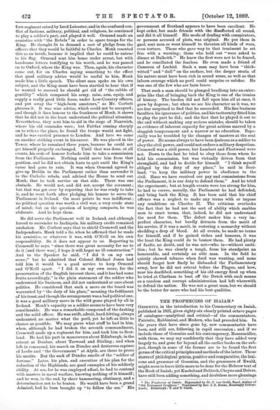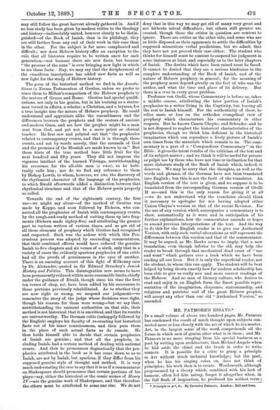THE PROPHECIES OF ISAIAH.*
GESENIIIB, in the introduction to his Commentary on Isaiah,. published in 1821, gives eighty-six closely printed octavo pages. of catalogue—analytical and critical—of the commentators, Patristic, Rabbinical, and Modern, who had preceded him. In the years that have since gone by, new commentaries have - been, and still are, following in rapid succession ; and if we• include those of Gesenius and his contemporary, Rosenmilller, with them, we may say confidently that they have added very largely to, and gone far beyond all the earlier books on the sub-. ject, though in some of the former are to be found the first germs of the critical principles and methods of the latter. Those stores of philological genius, positive and comparative, the lexi- cons and grammar of Gesenius, and the grammars of Ewald, might seem to leave little more to be done for the Hebrew text of the Book of Isaiah; yet Knobel and Delitsch, Cheyne and Driver, have still been adding something, and doubtless more gleanings * The Prophecies of Isaiah. Expounded by Dr. C. Ton Orelli, Basel, Author of' "Old Testament Prophecy." Translated by Bev. J. 0. Banks, Headingly Collegse Leeds. Edinburgh : T. and T. Clark.
may still follow the great harvest already gathered in. And if no less study has been given by modern critics to the theology and history—indissolubly united, however clearly to be distin-
guished—of the Book. of Isaiah, than is its philology, they are still farther from any end of their work in this case than
in the other. For the subject is far more complicated and difficult ; nor does Hebrew history offer an exception to the rule that all histories require to be written anew for each generation,—not because there are new facts, but because "the process of the suns" is ever bringing new light in which to see those facts. Nay, we may say that the decipherment of the cuneiform inscriptions has added new facts as well as new light for the study of Hebrew history.
The germ of the historical method we find in the Annota- Hones in Novwm. Testamentum of Grotius, unless we prefer to trace them to Milton's comparison of the Hebrew prophets to the orators of Greece and Rome. G-rotius had special qualifi- cations, not only in his genius, but in his training as a states- man versed in affairs, a scholar, a Christian, and a layman, for a true insight into the nature of Hebrew prophecy. He could understand and appreciate alike the resemblances and the differences between the prophets and the orators of ancient and modern times, and see how the prophet might be a man sent from God, and yet not be a mere priest or clerical teacher. He first saw and pointed out that "the prophecies related to contemporary events, and that it is through those events, and not by words merely, that the counsels of God and the promises of the Messiah are made known to us." But these hints of the true method bore little fruit for the next hundred and fifty years. They did not impress the vigorous intellect of the learned Vitringa, notwithstanding his reverence for the all-able man (4 irc'eyv), as he habi- tually calls him ; nor do we find any reference to them by Bishop Lowth, to whom, however, we owe the discovery of the rhythmical character of the language of the prophecies, to which Ewald afterwards added a distinction between that rhythmical structure and that of the Hebrew poets properly so called.
Towards the end of the eighteenth century, the first use—we might say abuse—of the method of Grotius was made by Koppe, and soon followed by Eichorn, who con- nected all the prophecies of Isaiah with contemporary events, by the rough-and-ready method of cutting them up into frag- ments (Eichorn made eighty-five) and attributing the greater part to various writers of various times, and so got rid of all those elements of prophecy which Grotius had recognised and respected. Such was the ardour with which this Pro- crustean process was adopted by succeeding commentators, that their combined efforts would have reduced the genuine Isaiah to five chapters and six verses of a sixth, only that in a variety of cases the evidently spurious prophecies of one critic had all the proofs of genuineness in the eyes of another. There is an amusing account of this fight of Kilkenny cats by Dr. Alexander, quoted in Sir Edward Strachey's Jewish History and Polities. This disintegration now seems to have been permanently reduced within more reasonable limits, chiefly under the guidance of Ewald, though since his time the first ten verses of chap. xxi. have been added by his successors to those portions previously rehabilitated. As to whether they are now right or wrong, we suspend our judgment—we remember the story of the judge whose decisions were right, though his reasons for them were wrong—but we say that, notwithstanding the eminent authorities on that side, their method is not historical, that it is uncritical, and that its results are untrustworthy. The German critic (unhappily followed by the English) employs his faculty of re-creating lost historical facts out of his inner consciousness, and then puts them in the place of such actual facts as do remain He thus holds himself able to decide that certain prophecies of Isaiah are genuine; and that all the prophets, in. eluding Isaiah, had a certain method of dealing with national events. And then he pronounces dogmatically that the pro- phecies attributed in the book as it has come down to us to Isaiah, are not by Isaiah, but spurious, if they differ from his supposed genuine style of thought and method. It is very much understating the case to say that it is as if a commentator on Shakespeare should pronounce that certain portions of his plays—say, either the historical or the comic scenes of Henry 1V.—are the genuine work of Shakespeare, and that therefore the others must be attributed to some one else. We do not
deny that in this way we may get rid of many very great and not hitherto solved difficulties ; but others still greater are created, though these the critics in question are content to ignore. There are critics on the other side, and some who are as little disposed as their opponents to settle the difficulties by supposed miraculous verbal predictions, but we admit that they have not yet proved their case either. The student who thinks for himself must be content to suspend his judgment in some instances at least, and especially as to the later chapters of Isaiah. The doubts which have been raised must be faced.
It cannot be denied that they are a serious hindrance to the- complete understanding of the Book of Isaiah, and of the nature of Hebrew prophecy in general ; for the meaning of the prophecy must depend greatly on the fact of who was the. author, and what the time and place of its delivery. But there is a crux in every great problem.
Professor von Orelli, whose Commentary is before us, takes a middle course, attributing the later portion of Isaiah's prophecies to a writer living in the Captivity, but leaving all the rest to Isaiah himself. For the authenticity of these, he relies more or lees on the orthodox evangelical view of prophecy which characterises his commentary in other respects. But he knows Canon Cheyne, and Schrader, and he is not disposed to neglect the historical characteristics of the prophecies, though we think him deficient in the historical imagination which can reproduce a lively picture of Isaiah's- own times from the materials which remain to us. The com- mentary is a part of a "Compendious Commentary" on the Bible : it gives the latest results of the criticism of the text and of its subject-matter ; and we think it will be useful for private or pulpit use by those who have not time or inclination for that more elaborate study of the Book of Isaiah which, indeed, it deserves. We may be sorry that the thoughts, as well as the words and phrases, of the German have not been translated into English ; but this is not the fault of the translator. An English version of the text is given,. and we suppose it to be translated from the corresponding German version of Orelli. If so—and this is the only reason for giving it at all —we do not understand why the translator should think it necessary to apologise for not having adopted either- Canon Cheyne's version or that of the recent Revision. For the use of any version which accompanies a commentary is to show, automatically as it were, and in anticipation of his further explanations, how the commentator amends or hopes to amend previous interpretations of the text. And the way to do this for the English reader is to give our Authorised Version, with only such verbal alterations as will represent the differences between this version and that of the commentator.
It may be argued, as Mr. Banks seems to imply, that a new translation, even though inferior to the old, may help the reader to break through that mechanical dead crust of "use
and wont" which gathers over a book which we have been reading all our lives. But it is only the superficial reader, not
the student, to whom this can apply. The student will be best helped by being shown exactly how far modern scholarship has. been able to give us really new and more correct readings of the Hebrew. And no man of literary culture, who desires to read and enjoy in an English form the finest possible repre- sentation of the imagination, eloquence, statesmanship, and religious and patriotic zeal of the great Hebrew prophet, will accept any other than our old "Authorised Version," so, amended.



















































 Previous page
Previous page